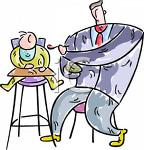Typhoid Fever
Causative organism:
Typhoid fever is caused by Salmonellae typhi (or salmonella paratyphi) bacteria.
Incidence:
Worldwide, typhoid fever affects more than 13 million people annually, with over 500,000 patients dying of the disease.
Mode of transmission:
Typhoid fever is contracted by the ingestion of contaminated food or water with the stool containing the bacteria from a case or asymptomatic carrier.
Symptoms:
- Poor appetite
- Headaches
- Generalized aches and pains
- Fever (reaching 39-40 degree celecius)
- Lethargy
- Diarrhea
Complications:
- Overwhelming infection
- Pneumonia
- Intestinal bleeding
- Intestinal perforation
Diagnosis:
Stool cultures are sensitive in the early and late stages of the disease but often need to be supplemented with blood cultures to make the definite diagnosis.
Prophylaxis and Treatment:
- Following the regular hygienic measures and avoiding drinking or ingestion of contaminated water or food with the bacteria
- The Typhoid vaccine could be given at any time after the age of 2 years and could be repeated each 2-3 years
- The definitive Treatment is by Antibiotic therapy (Chloramphenicol,3rd generation cephalosporin) the choice of antibiotic should be guided by the result of culture and sensitivity as there are some resistant strains.
For further information concerning the disease, vaccine and /or the treatment call 2356

Articles
2356
Home Visit Service
Your Baby checkup
Is my child developing normally?
what are the vaccinations that he should have taken until now?
Generate a report for my baby.
what are the vaccinations that he should have taken until now?
Generate a report for my baby.
Birthdate *
Track Your Baby Vaccinations
Receive reminders by email for the Vaccination timing
Find Your Baby name
Visit our Clinics
Mohandessin
Address
View Map
21 Batal Ahmed Abdel Aziz St, 3rd floor
Telephones
01002195777
01000012400
0233048350
Beverly Hills
Address
View Map
Beverly Hills, Building 29 services, behind Super Market Al Mokhtar, floor 1.
Telephones
01000012900
0238576831
El Tagamo3
Address
View Map
Elegantry Mall, Unit 221
Telephones
01000012800
01000884592
Al Sheikh Zayed
Address
View Map
Al Sheikh Zayed - Entrance 2,Downtown Mall - In-front of Spectra ,First Floor - Clinic 113
Telephones
02- 38514031
01000608597
Please enter your e-mail



